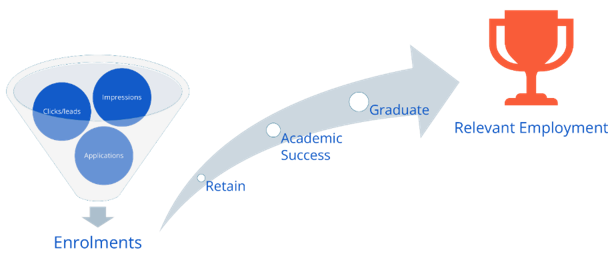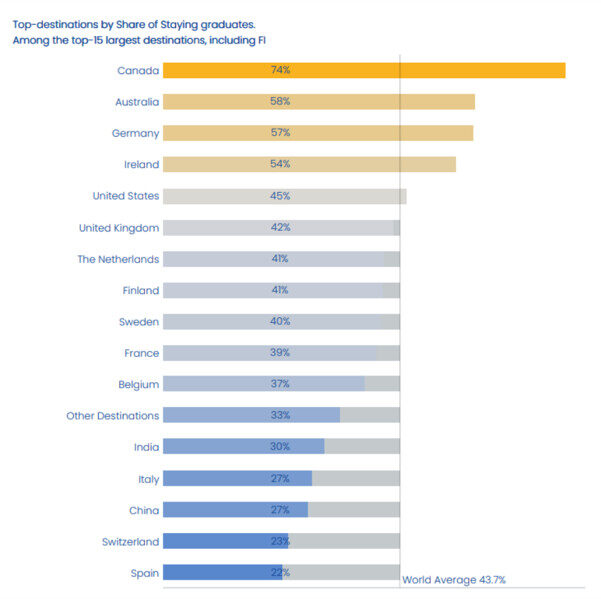Making graduate outcomes a strategic priority


For years, higher education institutions have focused heavily on attracting and enrolling international students, largely because of the significant financial benefits they bring. This reliance has become increasingly clear as domestic policies in popular destinations such as the UK, Canada, and Australia now aim to limit the number of incoming international students. Governments are also prioritizing national interests over internationalisation strategies, putting pressure on universities to reduce staff or programmes that rely on the financial security provided by international enrolments.
At the same time, the global higher education market has become more competitive. Institutions across the world now fight to attract top international talent, seeking to improve diversity, boost global rankings, and secure new revenue streams. This competition, often described as a “global race for talent,” has encouraged universities to look beyond recruitment and consider the long-term success of their graduates. Today, a student’s journey is evaluated not just by academic achievement, but also by employability, social integration, and contribution to the host country after graduation.

On the one hand, this can have an economic impact as governments and universities realise the true value of international students beyond just paid tuition fees, but that these are graduates who remain in their chosen study destination to contribute to the economy by filling skill gaps, driving innovation, and supporting local industries. On the other, there is also the social integration aspect that students integrated in society end up entering the local job market, enhance the multicultural understanding of society, and builds globalised networks.
The Three Personas of International Students
As institutions consider this new approach and the benefits that international students bring, so too has the scope of the ‘international student’ been broadened to different between a:
- Staying student: international students that see the potential benefits of remaining in their country of study and take advantage of the local employment opportunities, immediately putting their fresh skills into good use.
- Homecoming student: following their study abroad period, these students decide to return home, but with the added benefit that the premium of a foreign degree raises their perceived value before employers in their home countries.
- Nomad student: a very unique situation in which an international student leaves where they have studied but also do not return home, instead taking their academic qualification and skills to a third country. This can take place for a range of reasons such as better employment opportunities, post-study work rights, social networks, ethnic diasporas, and so on.

Why Graduate Outcomes Are a Strategic Imperative
Why institutions should consider this new, or newly realised stage of the student journey (i.e. graduate outcomes)? To remain relevant, institutions must appeal to students seeking not only academic excellence but also career opportunities, industry links, and transferable skills. In a sense, the role of the institution as a degree awarding body is becoming combined with the role(s) of student service, employment agent, researcher, and ultimately caregiver. No matter the tuition fee price tag attached to the programmes students will pay, they need to be sold that their investment is tagged with some level of guarantees that they will be heard, served, and guided towards becoming successful graduates.
Many institutions are already adapting to this shift, particularly those featured in major rankings such as Times Higher Education, QS, Financial Times, and the Academic Ranking of World Universities. To stay competitive, these universities focus not only on academic excellence but also on graduate outcomes, sustainability, and employer reputation. Yet, for institutions still defining their strategy, the key challenge is learning how to align institutional goals with evolving student expectations and programme value.
The Power of Data
The solution lies in combining institutional resources with a clear strategy and a data-driven approach to understanding student outcomes. This involves tracking alumni, forming partnerships with industry and labour markets, and continuously scanning employer needs. By piecing together where graduates work, in which fields, and how well their roles align with the skills your institution provides, universities can better prepare the next generation for meaningful careers.
Studyportals is aiming to support institutions is by providing data on the graduate employment outcomes with data that tracks over 310,000 international graduates at one, two, and three years post-graduation. Each graduate record can include up to ten entries, detailing their employers, sectors, job titles, and duration of employment. Most importantly, institutions can see whether these roles align with the graduate’s field of study. This data can then be benchmarked across destinations and peer institutions, helping universities understand whether their programmes and the location they are based in might have an influence on student decision-making.

In today’s digital world, prospective students rely heavily on the experiences and outcomes of their peers when making enrollment decisions. Institutions that can demonstrate strong graduate outcomes will naturally attract top talent and justify the significant investment students make in their education.
It is time for universities to fully embrace graduate outcome tracking as a core strategic priority. By leveraging alumni data, strengthening employer connections, and positioning themselves as launchpads for global careers, institutions can establish a reputation for producing successful, career-ready graduates.
Universities that adopt a data-driven approach to graduate outcomes gain a clear edge in recruitment, rankings, and employer partnerships. By leveraging Studyportals’ insights, your institution can make informed decisions that transform graduates into career-ready professionals.
Contact consulting@studyportals.com to explore how data can elevate your graduate outcomes strategy.


